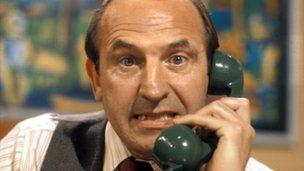Silent call fines raised to £2m
- Published

Thousands of people still complain every year to Ofcom about silent calls
Fines of up to £2m, rather than £50,000, may now be imposed on companies that make nuisance silent calls.
MPs approved the change this week and the higher fine limit will come into force in the last week of September.
The telecoms regulator Ofcom will have the power to impose the fine on firms that make too many silent marketing calls to people's homes.
The calls are still the most common source of complaint to Ofcom.
They are widely seen by the public as irritating and even distressing.
"Ofcom welcomes the decision to increase the penalty to £2m for companies breaching rules on silent and abandoned calls," said the regulator's chief executive Ed Richards.
"The increase reflects the potential seriousness of the harm caused to consumers by the unsolicited and intrusive nature of silent and abandoned calls and enables Ofcom to effectively regulate these activities."
Knocking and running away
MPs on the delegated legislation committee approved on Monday an order to raise the current level of fine which had been put up to £50,000 in 2006.
The fine can be imposed on a company where more than 3% of the calls it makes in a 24-hour period are abandoned, and thus left silent, once someone picks up the phone.
"The calls are particularly concerning to vulnerable people and the elderly," said the communications minister Ed Vaizey.
Labour MP Kevin Brennan described the calls as the corporate equivalent of little boys knocking on someone's door and then running away.
"What happens is that companies, operating legally in the United Kingdom, phone up citizens in their homes in the full knowledge that a percentage of those phone calls will result in a nuisance, silent call or an abandoned call leading to a recorded message, rather than to a human being at the other end of the line," he said.
"That is part of the business model.
"Unfortunately, the predictive dialling equipment from time to time dials more people than there are live operators available - more calls are answered than was predicted, so a silent call or, more often these days, a call containing a recorded message results," he explained.
Persistent misuse
Mr Vaizey recalled that Barclaycard had been fined £50,000 in 2008 for making thousands of silent calls in an eight-month period.
"Ofcom felt that it was hampered in that it was able to issue only a £50,000 maximum penalty," Mr Vaizey said.
"Since then, it has taken informal action against 22 companies," he added.
He pointed out that the new higher fine could be imposed for other forms of persistent telephone misuse such as:
the misuse of automated calling systems
number scanning
withholding calling line identification facilities
using systems for dishonest gain
misusing allocated telephone numbers.
The trade body the Direct Marketing Association (DMA) welcomed the increased level of potential fines.
"As telemarketing is increasingly under scrutiny, there is an even greater need to adhere to best practice as outlined in our DMA code of practice to protect consumers from inappropriate behaviour," said Caroline Roberts of the DMA.
"It is therefore essential that companies in breach of industry regulations are penalised accordingly".
- Published26 August 2010
- Published1 June 2010